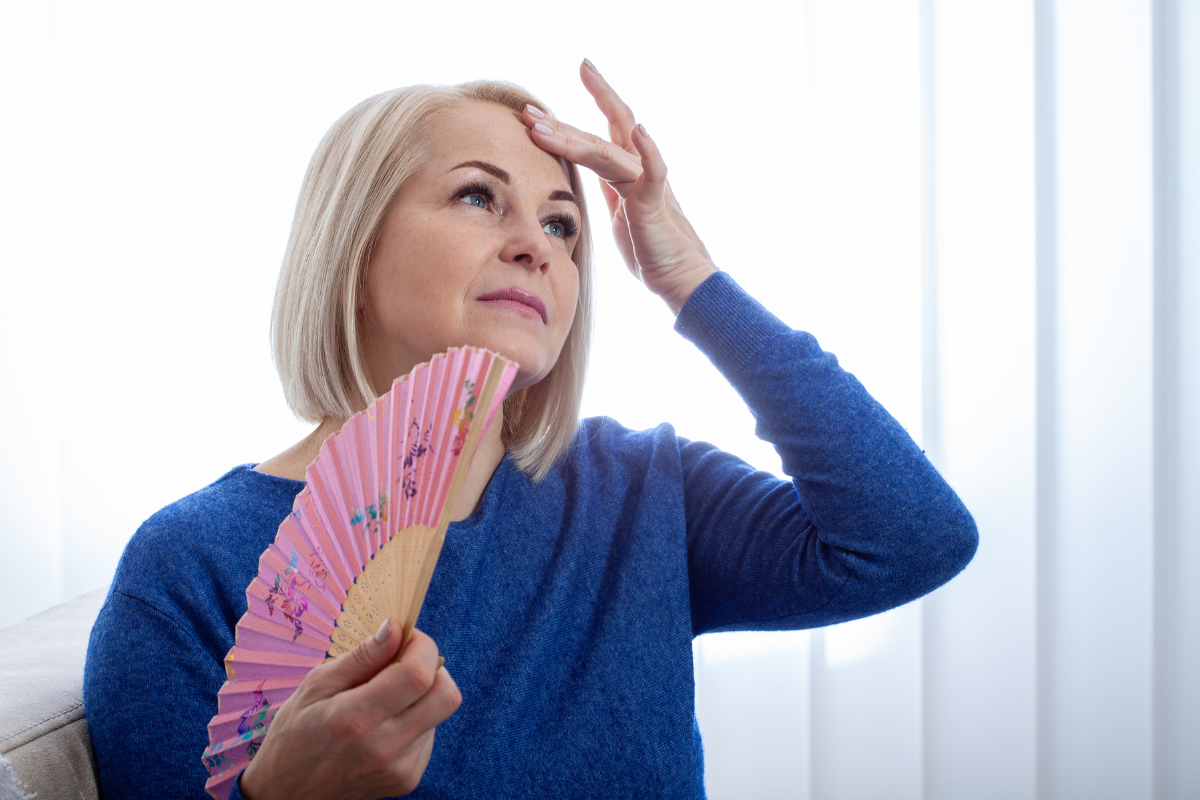
12 Symptoms of Perimenopause: What is Happening to Your Body?
Signs of perimenopause can creep up on women, a bit like a lion creeping up on its prey, very quietly in a stealth like mode. Before you realise it your once balanced happy self has become an anxiety ridden, energy lacking hot mess. Simple things in life suddenly seem to become a lot harder, steering your way through low mood, aching joints, weight gain and a million other symptoms of perimenopause can seem incredibly overwhelming.
Knowing the symptoms of perimenopause can make all the difference in how you cope with this period in your life. Perimenopause can begin for many women in their early forties, with some women starting with symptoms in their thirties.
Perimenopause symptoms can start off so slowly, that we don't really notice them, we feel a little more tired, we have put on a little bit of weight, our mood feels a little flat, is that really more hair coming out in the shower in the morning? Maybe you are just working too hard, family life is extra busy you think to yourself, many of the symptoms can be put down to a busy life and that is what women tend to do because we are so very good at putting ourselves last.
We struggle on, sometimes for years, it is not uncommon for perimenopause symptoms to last 10 years or more. For many women, usually by the time they reach their late forties or early fifties and have begun to miss an odd period or two, will they then begin to think maybe this is perimenopause.
Making small lifestyle changes when you first start experiencing perimenopause symptoms can have a dramatic effect on the bumpiness of your menopause journey, this is why it is so important to recognise the symptoms.
Check out Pure Goddess Downloadable Digital eBook: Perimenopause Symptom Checker: Your Essential Guide to Understanding and Managing Perimenopause Symptoms
What is Perimenopause?
Perimenopause is a natural stage in a woman’s life that occurs as she starts to approach menopause. Menopause is defined by the absence of a period for 12 months or more. During perimenopause, a woman’s body undergoes hormonal changes as our ovaries begin to produce less estrogen and progesterone. It is this fluctuation of hormones that causes the symptoms of perimenopause for some but not all women.
When Does Perimenopause Happen?
Perimenopause usually starts in our 40s, the duration of perimenopause can be anywhere from 4-10 years for some women but can also be as short as one year.
Generally speaking, when you have had no period or spotting for approximately 12 months, you can be confident that you have reached menopause. You are then likely to be classified as ‘post-menopausal’ which brings its own set of symptoms that we will save for another blog!
Can They Test For Perimenopause?
Not really, because our hormones naturally fluctuate constantly on an hourly and daily basis, a blood test is not an accurate way to diagnose perimenopause or menopause. The Australian Menopause Society discusses diagnostic testing for menopause but best practice states that assessing symptoms via the Modified Greene Scale (Australian) is the most reliable way to ascertain if a woman may be perimenopausal.
A score of 15 or more usually indicates estrogen insufficiency, if you think your symptoms might be perimenopause it is a good idea to keep a diary or list of them to take to your GP.
Can I become pregnant during perimenopause?
Yes, but the chance of pregnancy is reduced. Your ovaries no longer produce the number of eggs they once did. Your ovaries will start to move into retirement and wind down which can cause havoc with your hormones sending them into a tantrum and causing estrogen and progesterone to fluctuate, this will in turn affect your periods.
For some women periods can become a pain to manage. Often heavier, lighter, shorter or longer, more uncomfortable, or in some cases disappear for a couple of months only to return again out of the blue and usually when most inconvenient.

The 12 most common symptoms of perimenopause
1. Brain Fog
Is your memory playing tricks on you, are you suddenly misplacing your car keys or wondering why when you go to pull your wallet out of your handbag you instead grab a block of cheddar cheese, only then realising your wallet is sat on the shelf in the fridge. This is not actually loss of memory, for the majority of women who suffer this and similar scenarios, it is something called brain fog. Fluctuating hormones wreak havoc on our cognitive function.
2. Weight gain
It is fact that as we age, we gain weight, this is usually due to our lifestyle becoming slightly more sedentary, we just are not as active as we were in our 20’s. We also begin to lose muscle from the age of 30, muscle uses more energy, so our metabolism is more efficient the more muscle we have. But hormones also influence our weight, and many women find they gain weight around the time of perimenopause, especially around the middle. We can also feel far more bloated than usual, our digestive system just does not perform as well when our hormones fluctuate.
If weight gain is a concern for you during perimenopause, then why not try our carefully formulated, evidence-based Metabolism and Energy Superblend, designed to promote weight loss and increase metabolism. You can read all about its great benefits here.
If you need some inspiration for recipes and general well-being, check out our Pure Goddess digital download: 28 Day Pure Goddess Metabolic Reset E-Program
3. Insomnia
During perimenopause our usual sleep pattern can be completely disrupted, struggling to get a good night's sleep can be one of the first more noticeable signs of perimenopause for a lot of women. You may find you suddenly start having trouble falling asleep or staying asleep no matter how tired you are. Lack of sleep if left untreated can be extremely debilitating and can increase the severity of other perimenopause symptoms such as brain fog and tiredness.
4. Night Sweat and Hot Flashes
Night sweats and hot flashes are very common, up to 75% of perimenopausal women experience them and they are a perimenopause symptom that women find virtually intolerable. Waking up during the night soaked in sweat definitely adds to the lack of sleep, some women report their night sweats to be so bad that they have to change their nightclothes 2 or 3 times a night.
Hot flashes are primarily associated with hormonal changes, particularly fluctuations in estrogen levels. Hot flashes are characterised by a sudden feeling of intense body heat, they can often be accompanied by sweating, flushing of the face and body and heart palpitations.
The pathophysiology of hot flashes involves dysfunction of the thermoregulatory nucleus in the brain, which regulates core body temperature. As estrogen levels decline, particularly during menopause, the hormonal changes occur.
It is still not fully understood why women suffer from hot flashes during perimenopause and menopause.
5. Mood Swings
Hormonal fluctuations during perimenopause can affect our mood. You might experience irritability, anxiety, depression and mood swings.
“There’s a clear correlation between perimenopause and the drop of oestrogen,” said Alicia Jackson, founder and chief executive of Evernow.
A women’s telemedicine start-up conducted a study on 40,000 women going through menopause. This study found that nearly 60 percent reported severe anxiety or depression.
“It’s not all in their head; it’s in their bodies and not some made-up thing.”
6. Lack of Energy
Fluctuating hormones, lack of sleep and low mood can all compound and cause women to feel constantly fatigued. While battling the symptoms of perimenopause many women are juggling careers and families, this can leave you feeling exhausted, a feeling that we are always running on an empty tank.
The afternoon slump becomes an everyday occurrence, reaching for the chocolate muffin and strong coffee to see you through until the kids are in bed or work is finished. We totally understand this feeling at Pure Goddess, we have lived it, this is why we designed our Metabolism and Energy Superblend, a perfect powerhouse of scientifically proven ingredients that support and enhance energy production.
How Metabolism & Energy Superblend can help you during menopause:
- Supports a healthy metabolism and blood glucose
- Supports metabolic energy production
- Increases calorie burning and the utilisation of carbs and sugar
- Helps support weight loss
- Curbs food cravings and reduces appetite
- Supports healthy thyroid function
- Supports healthy cholesterol
- Increases energy
- Gives a feeling of wellbeing and vitality
Learn more about Metabolism & Energy Superblend here.
7. Vaginal Dryness
Vaginal dryness and discomfort are a common symptom of perimenopause, caused by falling levels of estrogen which is a natural lubricant. You might feel discomfort during sex, itchiness and irritation and sometimes a feeling of burning. Around this time, you may also suffer from increased urine infections and thrush.
8. Changes in Libido
Hormonal changes during perimenopause can also affect sex drive. You may experience a decrease in libido or changes in your sexual desire. Sometimes this can be due to testosterone levels falling, testosterone is also an important female hormone that impacts perimenopause.
9. Joint Pain and Stiffness
Hormonal changes such as lower estrogen levels can cause stiff and aching joints during perimenopause. Sometimes joint pain can appear suddenly, knees, hips or backs may start aching for no apparent reason, in an area that you have previously never had pain. Many women find that replacing the declining hormones can virtually eliminate joint pain and stiffness and enable them to lead a pain free life again.
Joint pain and stiffness can also be a direct result of declining collagen and muscle as we age. After the age of 30 we lose around 1% of our collagen per year and this increases rapidly during and after menopause. Type 1 Collagen makes up roughly 80-95% of our bones matrix so supplementing with a good collagen that includes type 1 collagen is a great way to support bones in perimenopause and menopause. After the age of 40 collagen supplementation needs to be around 10 grams of collagen or more per day to see and feel the benefits. You can read more about the importance of collagen supplementation here and we highly recommend our best selling Luminance Collagen Peptides which come in handy 10 gram single serve sachets.
10. Headaches and Migraines
Just as some women suffer with more headaches and migraines around the time of their period, the same can happen to some women during perimenopause. Some women are very sensitive to hormonal fluctuations and can find that headaches or migraines increase during this time.
11. Irregular Periods
Perimenopause is characterised by a fluctuation in hormone levels which can result in irregular periods. Women can experience heavier or lighter periods, longer or shorter cycles and can also miss periods completely.
Many women find their periods become much heavier during perimenopause, this can exacerbate the tiredness and even lead to low iron levels and anaemia.
12. Digestive problems
Perimenopause can disrupt our digestive system, stomach issues, cramping and bloating can all become the norm. Some women find that they become overly sensitive to certain foods all of a sudden or begin to suffer with IBS symptoms. Bloating in perimenopause is a problem for many women, again this is caused by estrogen levels diminishing.
Digestive issues during perimenopause can also lead to a sudden widening of our waistlines, this is the phenomenon known as 'meno belly' it is not a made up term. Many women in perimenopause suddenly find that they gain weight around their middle and gut health and a slowed digestion due to fluctuating estrogen levels directly impact this. You can read more about the dreaded menopause belly here.
How can I help symptoms of perimenopause?
Diet
During perimenopause it is very important to eat a healthy balanced diet. Many scientific studies have found that sugar and alcohol increase the severity of perimenopause symptoms, so trying to reduce or cut these out of your diet will help how you feel. Other studies have shown that increasing protein in your diet can also have a very positive effect on symptoms.
Ensuring you eat enough protein per day is extremely important once you reach perimenopause, menopause or beyond. 20-30 grams of protein per meal will help curb food cravings, support your metabolism, stop feelings of hunger, help balance blood sugars and insulin, support healthy bone and muscle health, the list goes on. Did you know that eating plenty of protein will even improve the health of your skin, including wrinkles, dryness and even cellulite.
This is why we made sure our brand new Menopause Shake includes 25 grams of protein per serve. The Menopause shake will help with weight loss, bloating, meno belly, increased energy, hot flashes and menopause symptoms including brain fog, all in a creamy natural chocolate flavoured shake! Read more about the Menopause Shake here.
Hydration
Staying well hydrated can reduce the occurrence and severity of hot flashes, plus keeping well hydrated means you are less likely to feel tired from dehydration and you are less likely to feel hungry, sometimes we eat not because we are hungry but because we are dehydrated. Try to consume between 2-3 litres of water per day, your skin and wellbeing will thank you for it.
Regular Exercise
Regular exercise has been shown to improve mood, reduce hot flashes and improve sleep quality. A daily walk in the fresh air is a great way to add in gentle exercise, so are things like yoga and pilates. We should stay away from high intensity exercise when in perimenopause or menopause, high intensity exercise can add stress to the body and increase cortisol levels. When we age an increase in cortisol levels can also mean an increase in our mid-section, it can cause weight gain around our tummy and bloating.
Some light weight training or resistance exercise is good though, trying to keep or add some muscle to our bodies prevents muscle loss as we age, this can help improve our metabolism and stamina.
Manage Stress
Stress can really be a trigger for increasing perimenopause symptoms, so try to find healthy ways to manage stress such as meditation, deep breathing or gentle exercise such as yoga. Check out our Mindfulness and Meditation blog here.
Sleep
Although getting a good night's sleep if you are perimenopausal can sometimes feel virtually impossible, lack of sleep can increase mood swings, tiredness and appetite. Try to set a good routine, try rising at the same time each day and going to bed around the same time each night. Try not to spend too much time on mobile phones or watching tv before bed, and alcohol and sugar are not your friend for a good night's sleep.
Avoid triggers
Avoid certain triggers that are known to increase the severity of symptoms, like spicy food, alcohol, sugar and excess caffeine.
Hormone Therapy
Speak to your GP to see if hormone therapy could be right for you. Replacement hormone therapy can be a really effective way of reducing symptoms and giving you back the life you had prior to perimenopause. It is not for everyone, but for many women it can give them back the spring in their step.
Will perimenopause affect me?
You may be wondering if you will experience all of these symptoms when it's your turn. There is some good news in the fact that approximately 60% of women will experience quite mild symptoms, 20% of women will experience no symptoms at all and question whether they are indeed in the menopausal stage.
Approximately 20% of women will experience severe signs and symptoms of perimenopause that will negatively affect their life. These approximate statistics are based on reviewed trends in Australia over the last 12 years.
The one thing we are absolutely sure about is that you are not alone on this journey. We have each other to lean on and we are the only ones who ‘get it’, so surround yourself with plenty of hormone sisters who have got your back!
Always speak to a Health Professional before commencing any kind of weight loss diet. Metabolism & Energy Superblend can help in the maintenance of a healthy body weight and helps increase weight loss when used in conjunction with a program of reduced intake of dietary calories and increased physical activity.









2 comments
Age 43 some of the symptoms sound so on point but I wonder if im still in denial 🤔😪 I feel like im still to young to go through this yet 😭😭
Krissy Lee
Omg. HELP
LESLEY Fay Dyson
Leave a comment
This site is protected by hCaptcha and the hCaptcha Privacy Policy and Terms of Service apply.